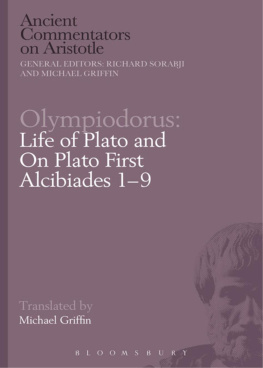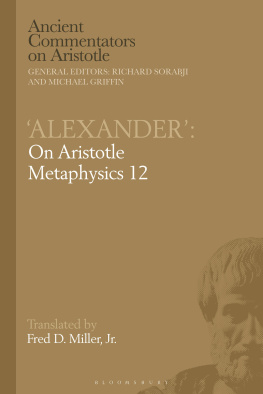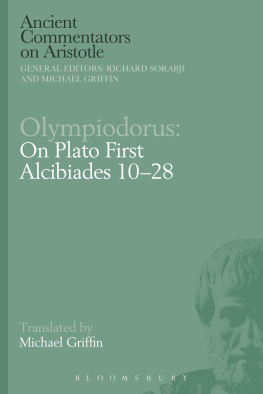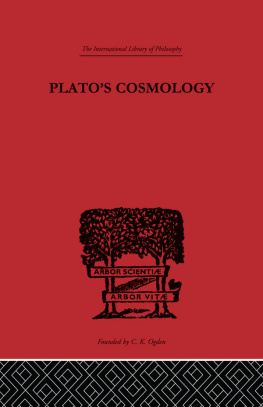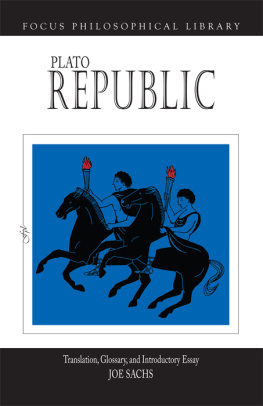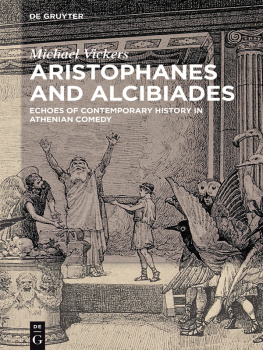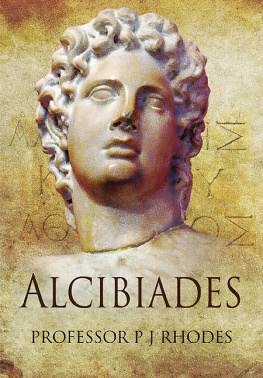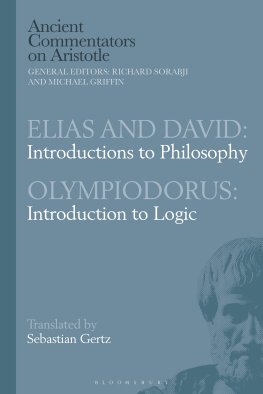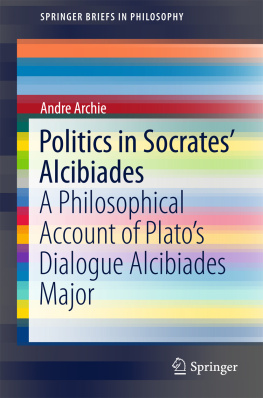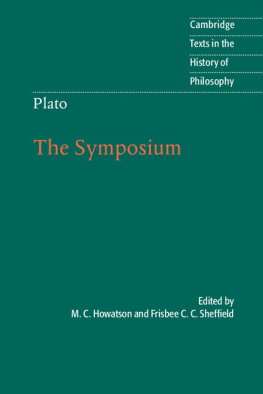Ancient Commentators on Aristotle
GENERAL EDITORS: Richard Sorabji, Honorary Fellow, Wolfson College, University of Oxford, and Emeritus Professor, Kings College London, UK; and Michael Griffin, Assistant Professor, Department of Philosophy, University of British Columbia, Canada.
This prestigious series translates the extant ancient Greek philosophical commentaries on Aristotle. Written mostly between 200 and 600 AD, the works represent the classroom teaching of the Aristotelian and Neoplatonic schools in a crucial period during which pagan and Christian thought were reacting to each other. The translation in each volume is accompanied by an introduction, comprehensive commentary notes, bibliography, glossary of translated terms and a subject index. Making these key philosophical works accessible to the modern scholar, this series fills an important gap in the history of European thought.

Contents
This translation has been long in the making. Alongside the generous funders and editors acknowledged above, I would like to extend my gratitude to Richard Sorabji for his encouragement to proceed with the project and his tireless and constructive criticism along the way; to the projects readers for their remarkably careful commentary and creative suggestions, and for saving me from many errors; to Mossman Rouech and Gyburg Uhlmann for valuable comments on the Introduction; to Harold Tarrant and Franois Renaud for thoughtful remarks and suggestions that improved the text in several places; and to Annie Hewitt for her characteristically diligent editing of the Introduction, First Lecture and Bibliography. I am also grateful to Ryan Fowler and de Gruyter Press for permission to reprint, in the Introduction, portions of my chapter Pliable Platonism? Olympiodorus and the Profession of Philosophy in Sixth-Century Alexandria, in R.C. Fowler (ed.), Plato in the Third Sophistic (Berlin: de Gruyter, 2014), 73101. Finally, I am glad to register a special debt of gratitude to Robert Todd, under whose kind and patient supervision I ventured to translate my first pages of Olympiodorus during my last undergraduate year at the University of British Columbia, and to Tobias Reinhardt and Michael Frede, under whose guidance at the University of Oxford I developed early drafts of the first lectures and Introduction. The volumes remaining defects, of course, remain entirely my own responsibility.
M.J.G.
[] Square brackets enclose words or phrases that have been added to the translation for purposes of clarity.
<> Angle brackets enclose conjectures to the Greek and Latin text, i.e. additions to the transmitted text deriving from parallel sources and editorial conjecture, and transposition of words and phrases. Accompanying notes provide further details
() Round brackets, besides being used for ordinary parentheses, contain transliterated Greek words.
Alc. = Plato First Alcibiades
Anon. Prol. = L.G. Westerink, Anonymous Prolegomena to Platonic Philosophy. Amsterdam: North-Holland Publishing Co., 1962; reprinted Westbury: Prometheus Trust, 2010
DL = Diogenes Laertius
El. Theol. = E.R. Dodds, Proclus: The Elements of Theology, 2nd edn. Oxford: Clarendon Press, 1963
Enn. = Plotinus Enneads
Herm. = Hermias
in Alc. = Commentary on the Alcibiades
in Gorg. = Commentary on the Gorgias
LS = A.A. Long and D.N. Sedley, The Hellenistic Philosophers, 2 vols. Cambridge: Cambridge University Press, 1987
LSJ = H.G. Liddell and R. Scott, A Greek-English Lexicon, 9th edn. Oxford: Clarendon Press, 1966
Olymp. = Olympiodorus
Plot. = Plotinus
Proleg. Log. = Olympiodorus, Prolegomena to Aristotelian Logic
Sorabji 2005 = R.R.K. Sorabji, The Philosophy of the Commentators 200600 AD. A Sourcebook, vol. 1: Psychology (With Ethics and Religion); vol. 2: Physics; vol. 3: Logic and Metaphysics. Ithaca: Cornell University Press, 2005 [first published London: Duckworth, 2004]
SVF = H.F.A. von Arnim, Stoicorum Veterum Fragmenta, 4 vols. Stuttgart: Teubner, 1964
For all other ancient works standard abbreviations are used.
The chapter and line number references for Olympiodorus On the Gorgias follow the edition of Westerink (1970). Those for Olympiodorus On the Phaedo follow the edition of Westerink (1976).
By the beginning of the sixth century, no philosopher of the old religion could have any illusions about the world in which he now lived. Platos meditations on the role of the philosopher in a corrupt city seemed to speak, only too well, of the non-Christian philosophers role in his own times.
(Peter Brown, Power and Persuasion)
So too if they accuse me, asking why I am teaching the youth, will they ever be persuaded that I do this in their interests, in order that they may become men of true quality (kaloi kagathoi)? So under such a constitution, one must create a fortress (teikhion) for oneself, and live quietly (hsukhazein) within it all the time.
(Olympiodorus, Lectures on Platos Gorgias 45.2,326)
Olympiodorus the Younger (c. 500570 AD),
The context of the Republic passage, also uttered by Socrates, draws out the force of Olympiodorus allusion:
The members of this small group have tasted how sweet and blessed a possession philosophy is, and at the same time theyve also seen the madness of the majority (tn polln) and realised that there is no ally with whom they might go to the aid of justice and survive, that instead theyd perish before they could profit either their city or their friends and be useless both to themselves and to others, just like a man who has fallen among wild animals and is neither willing to join them in doing injustice nor sufficiently strong to oppose the general savagery alone. Taking all this into account, they lead a quiet life (hsukhian ekhn) and do their own work. Thus, like someone who takes refuge under a little wall (teikhion) from a storm of dust or hail driven by the wind, the philosopher is satisfied if he can somehow lead his present life free from injustice and impious acts and depart from it with good hope, blameless and content.
(Republic 6, 496CE, tr. Grube, rev. Reeve, in Cooper and Hutchinson 1997)
The juxtaposition of Olympiodorus unconcealed paganism with his flourishing teaching career marks him out as an interesting figure for study at the intersection of traditional paideia and Christianity in the twilight of late antiquity. Who are they, the counterparts of Socrates hypothesised accusers (emou ean katgorssi, in Gorg. 45.2,323), on account of whose suspicions he saw fit to emulate the philosophers of Republic 6 and retreat to a teikhion? The turbulent social and political backdrop of his career offers some context: as a public intellectual committed to the value of Platonic philosophy and traditional Hellenic piety,
Olympiodorus fortress, perhaps, rested on the honour of his profession while carefully making room for the confessional comforts of his classroom.
Olympiodorus is careful to strike a conciliatory tone where the popular doctrine (suntheia) of Christianity is concerned. One often-cited example occurs in his lectures on the First Alcibiades (hereafter Alcibiades or Alc.). Proclus had remarked (

